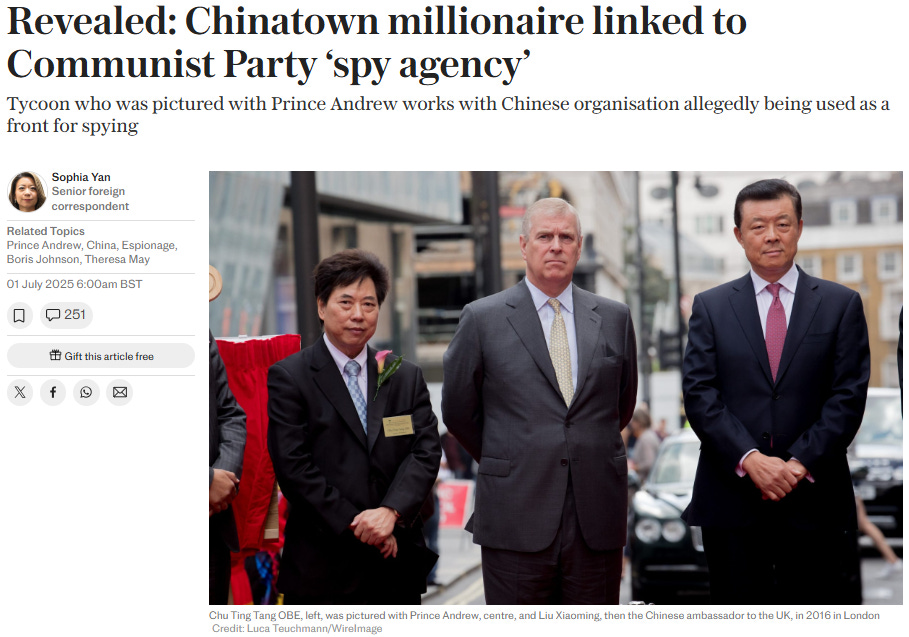The Spy Hunter #111
Chinese citizen arrested in Italy over cyber espionage campaign targeting vaccine research in America.
July 8, 2025
Welcome to The Spy Hunter newsletter!
In this week’s edition:
A Chinese citizen is arrested in Italy over allegations that he was involved in a large-scale cyber espionage campaign in 2020 targeting industrial secrets related to COVID-19 vaccines.
🔎Economic Espionage Case of the Week
What happened?
Xu Zewei, a 33-year-old Chinese citizen, was arrested on July 3 at Milan’s Malpensa Airport under a U.S. warrant tied to an FBI investigation into the Hafnium hacking group. The group is accused of conducting a large-scale cyber espionage campaign in 2020 targeting immunologists and research centers in the United States with the aim of stealing industrial secrets related to COVID-19 vaccines. Xu, alleged to be part of this group, faces multiple charges, including wire fraud, identity theft, and unauthorized access to protected computers. He has told authorities that he is an IT technician visiting Italy on vacation and opposes extradition, which will be addressed in an upcoming court hearing.
Why does it matter?
This case serves as a test of how willing European governments are to support U.S. cybersecurity enforcement, and it raises questions about how China will respond. A forceful reaction from Beijing, such as advising its citizens against travel to Italy, could cost Italy millions in tourism revenue and deter future arrests elsewhere in Europe. Conversely, if China allows the extradition to proceed quietly, it may signal a desire to deepen economic and political ties with Italy’s right-wing government. The upcoming visit of Italy’s Deputy Prime Minister and Infrastructure Minister, Matteo Salvini, to China will likely offer insights into the direction of the China-Italy relationship.
🌏Around the region
China
The Trump administration has lifted export restrictions on chip design software to China as part of a broader trade agreement aimed at easing tensions between Washington and Beijing.
The rollback affects major firms like Synopsys, Cadence, and Siemens, and it follows a deal in which the U.S. agreed to lift curbs on tech exports in exchange for China resuming rare earth shipments.
As I wrote last week, Chinese companies are also collaborating with Russian partners to develop their own chip design software (also called Electronic Design Automation or EDA) in order to reduce their vulnerability to these kinds of restrictions.
📖Best reads of the week
Revealed: Chinatown millionaire linked to Communist Party ‘spy agency’ - The Telegraph
Mr Tang was awarded an OBE for “services to Chinese people in Chinatown, Westminster, London” four years ago. But despite his high profile, there are no public references to his ties to the Chinese Communist Party.
His links to the UFWD are likely to ring alarm bells in Government and espionage circles, particularly after an alleged Chinese spy who worked with Prince Andrew was also linked to the organisation.
OpenAI clamps down on security after foreign spying threats - Financial Times
The company now keeps a lot of its proprietary technology in isolated environments, meaning computer systems are kept offline and separate from other networks, according to people familiar with the practices. It also had biometric checks in its offices, where individuals could only access certain rooms by scanning their fingerprints, they added.
📣Upcoming Events
8 July. China’s New London “Super Embassy”: Soft Power Hub or Security Risk? - CSIS. 2:00 PM ET [online]
In this video, CSIS experts Emily Harding and Aosheng Pusztaszeri break down the embassy’s strategic location and argue that, if approved, the new compound would pose significant national security risks to the United Kingdom and its allies.
9 July. Technology and Economic Security in the Indo-Pacific: A Trilateral Outlook for India, Japan, and South Korea - Council for Strategic and Defense Research. 11:00 AM New Delhi [in-person]
This roundtable discussion will explore the case for a formal India–Japan–South Korea trilateral framework amid shifting geopolitical realities.
🗣️Job Opportunities
Global Intelligence Analyst, Senior Associate - JPMorganChase (Singapore)
Researcher, Control Risks ONE - Control Risks (London, UK)
📰In Other News
Economic Espionage
CSIS issues espionage alert about suspect seeking sensitive information for Chinese intelligence - Global News
Luxembourg blind to China danger, says nominee for US ambassador - Luxembourg Times
Growing Concerns over Technology Leakage through 3D Printing Companies - Business Korea
Geopolitical risk
Trade war, geopolitical risks top central bank concerns in UBS annual survey - Investing . com
How should financial institutions navigate a fragmented world? - World Economic Forum
Economic Security
Quad countries agree to diversify critical mineral supplies amid China concerns - The Guardian
Brussels to stockpile critical minerals because of war risk - Financial Times
Technology
China is building an entire empire on data - The Economist
Why the U.S. Should Build Data Centers in Dubai and Riyadh - Foreign Policy
A new tech race is on. Can Europe learn from the ones it lost? - Politico
US-China relations
Does the United States need a China rethink? - Brookings Institution
In the AI Race with China, the US Can’t Afford Regulatory Paralysis - The National Interest
Xi Has Spent Decades Preparing for a Cold War With the U.S. - The Wall Street Journal
🛜Around the Web
Thank you for reading!
If you would like to leave a comment, ask a question, or make a suggestion, please post a reply below, email me at ben.forney@lazlointelligence.com, or reach out on social media:
X: @ben_forney
Bluesky: @benforney.bsky.social
LinkedIn: Ben Forney
The Spy Hunter is the personal opinion of the author and is not legal advice. Any individual or organization mentioned is presumed innocent until proven guilty. Articles or other media featured on The Spy Hunter should not be taken as an endorsement by the author.
Cover image by DALL-E









